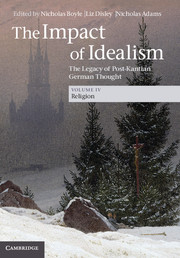Book contents
- Frontmatter
- Contents
- List of Contributors
- Acknowledgements
- List of Abbreviations
- Introduction: the impact of Idealism on religion
- 1 The impact of Idealism on Christology: from Hegel to Tillich
- 2 German Idealism's Trinitarian legacy: the nineteenth century
- 3 German Idealism's Trinitarian legacy: the twentieth century
- 4 Kierkegaard, Hegelianism and the theology of the paradox
- 5 Biblical hermeneutics: from Kant to Gadamer
- 6 Aesthetic Idealism and its relation to theological formation: reception and critique
- 7 The autonomy of theology and the impact of Idealism: from Hegel to radical orthodoxy
- 8 Faith and reason
- 9 Rabbinic Idealism and Kabbalistic realism: Jewish dimensions of Idealism and Idealist dimensions of Judaism
- 10 ‘In the arms of gods’: Schelling, Hegel and the problem of mythology
- 11 Dialectic and analogy: a theological legacy
- Bibliography
- Index
- References
10 - ‘In the arms of gods’: Schelling, Hegel and the problem of mythology
Published online by Cambridge University Press: 05 December 2013
- Frontmatter
- Contents
- List of Contributors
- Acknowledgements
- List of Abbreviations
- Introduction: the impact of Idealism on religion
- 1 The impact of Idealism on Christology: from Hegel to Tillich
- 2 German Idealism's Trinitarian legacy: the nineteenth century
- 3 German Idealism's Trinitarian legacy: the twentieth century
- 4 Kierkegaard, Hegelianism and the theology of the paradox
- 5 Biblical hermeneutics: from Kant to Gadamer
- 6 Aesthetic Idealism and its relation to theological formation: reception and critique
- 7 The autonomy of theology and the impact of Idealism: from Hegel to radical orthodoxy
- 8 Faith and reason
- 9 Rabbinic Idealism and Kabbalistic realism: Jewish dimensions of Idealism and Idealist dimensions of Judaism
- 10 ‘In the arms of gods’: Schelling, Hegel and the problem of mythology
- 11 Dialectic and analogy: a theological legacy
- Bibliography
- Index
- References
Summary
Im Arme der Götter wuchs ich groß.
HölderlinThe dream of ancient Hellas and its gods shaped the intellectual projects of Schelling, Hölderlin and Hegel from the very beginning. As students in Tübingen, they came to see Greece as a second homeland, whose language, culture and geography were as familiar as those of Germany but infinitely more attractive. To express their sense of the fundamental unity of the world, they adopted the slogan ‘Ἓν καὶ Πᾶν’ [one and all]. And when they sought to realise their hopes for a new union of poetry, philosophy and religion they called for a ‘new mythology’, with the Greek gods serving as model and inspiration. Even after Schelling and Hegel distanced themselves from such youthful utopianism, Greek mythology remained a crucial reference point for their philosophies. In their mature systems, it would serve as a rich source of metaphors and narratives, as a tool for critiquing and reconstructing Christian theology and (for Schelling) as a key to explicating the subterranean forces at work in the human psyche across the ages.
In turn, Idealism's rich legacy of speculation on myth would leave a lasting impact on the ‘science’ of mythology. To be sure, Vico and Herder had already identified myth as the storehouse of a people's earliest ideas about nature, religion, morality and law. Yet it was Idealist philosophy, particularly that of Schelling, that systematised these insights while suggesting that mythology could provide an intuition of the absolute itself. By linking mythology to the highest aspirations of religion and metaphysics, Schelling helped create a template that would be followed by many generations of scholars, whether philologists, theologians or anthropologists. Indeed, one can find echoes of the Romantic–Idealist approach to myth in the work of F. Max Müller, Franz Rosenzweig, Martin Heidegger and Mircea Eliade, among others. At the same time, however, the elevation of myth to a central category of cultural analysis gave new power to the project of demythologisation. The ‘negative’ concept of myth – as a form of illusion, distortion, or under-developed knowledge – became a tool for undermining not just particular stories or legends but entire religions, worldviews and social structures.
- Type
- Chapter
- Information
- The Impact of IdealismThe Legacy of Post-Kantian German Thought, pp. 246 - 273Publisher: Cambridge University PressPrint publication year: 2013

